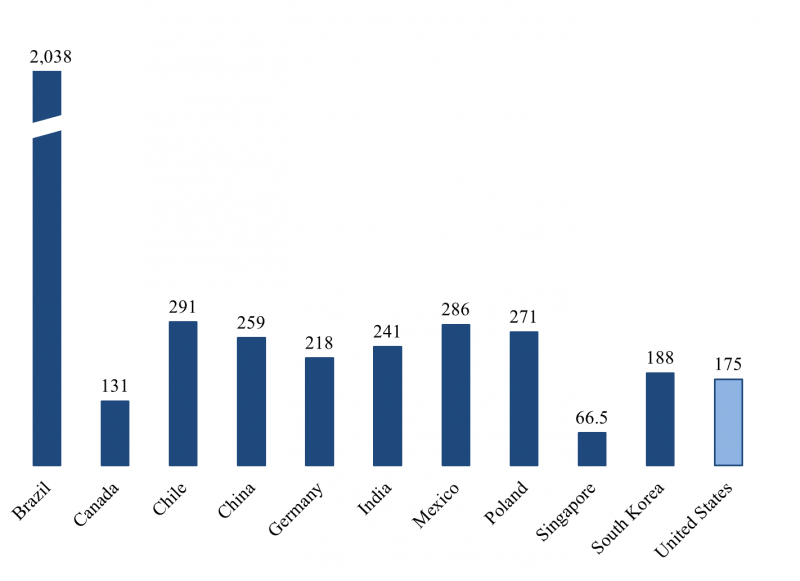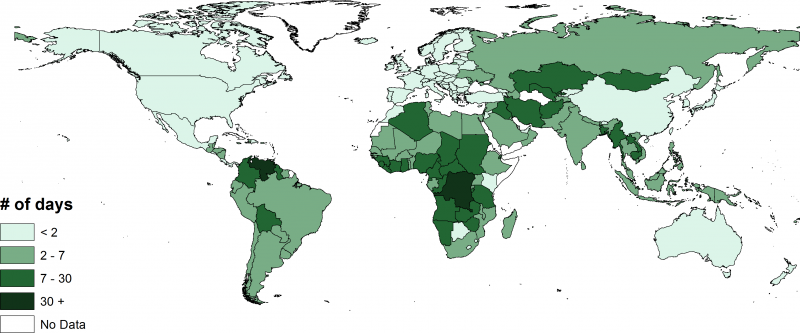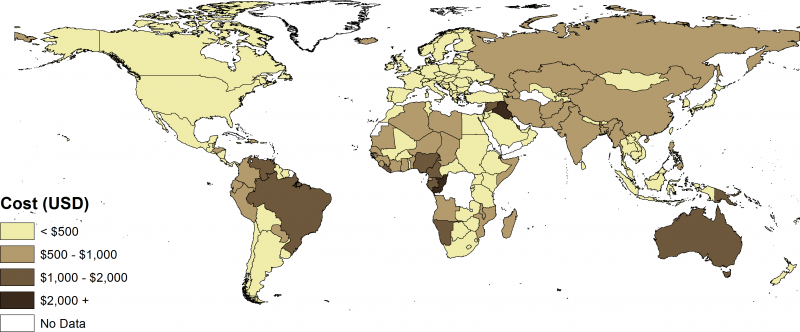
- U.S. business regulations are among the least burdensome in the world, with the United States ranking eighth out of 190 economies in the World Bank's 2017 Ease of Doing Business index.
- The regulatory environment in some countries can be opaque and inconsistent. Business interests abroad may not receive the same level of protection as they would in the United States.
- Companies that source or manufacture abroad should expect to devote extra resources to comply with:
- U.S. regulations on the importation of goods
- Foreign regulations on all aspects of business when operating abroad
The full cost impact of complying with regulations cannot be calculated easily, but the World Bank's Doing Business project provides a wealth of information to help guide firms in making these calculations. Doing Business provides objective measures of business regulations for local firms in 190 economies and selected cities, with topics including:
- Starting a business
- Dealing with construction permits
- Getting electricity
- Registering property
- Getting credit
- Protecting investors
- Paying taxes
- Trading across borders
- Enforcing contracts
- Addressing insolvency
Based on these topics, the Doing Business project developed an overall Ease of Doing Business index which ranks the United States eighth out of 190 economies.
Import Regulations
A company importing goods must comply with a range of U.S. government requirements. When a shipment arrives in the United States, the company must make arrangements to file entry documents with the director at the port of entry, pay the estimated import duties and secure the release of the goods from U.S. Customs and Border Protection (CBP). Companies often employ professional customs brokers to assist them with these tasks. A good source for information on customs brokers is the CBP INFO Center.
It is the responsibility of importers to comply with U.S. regulations in their importing operations. For example, an importer must provide a complete, accurate description of the imported goods and supporting documents to CBP, and it must comply with regulations such as rules of origin. CBP's publication Importing Into the United States outlines the requirements for specific products. However, CBP urges interested importers to contact their nearest CBP office for information on specific issues or questions.
Under the topic "Trading Across Borders," Doing Business estimates that importing goods into the United States requires an average of 10 hours for documentary and border compliance. The total cost of obtaining all the required documents and complying with all the necessary procedures for importing goods into the U.S. is estimated at $275. These costs compare favorably with many other countries.
A hypothetical case to illustrate the total cost of importing goods into the United States can be found in the discussion of shipping costs. This hypothetical example examines the total cost of importing one 20-foot container of products from Asia, taking into consideration the travel time for the cargo to reach the United States, the transit costs and other regulatory expenses.
On the other hand, exporting goods from the United States requires an average of 4 hours and $235, in addition to the advantages of manufacturing within the United States, such as easy access to local consumer markets.
Costs of Complying with Foreign Regulations
U.S. companies operating abroad are subject to the rules and regulations of their host countries. Taxes, government regulations and business environments vary across countries, are subject to change over time, and may be applied inconsistently.
In addition to the direct costs of taxes or obtaining permits, factors such as the ease or difficulty of getting business licenses, bank credits and property can greatly affect foreign companies' costs of doing business in those countries. Also, the rule of law in developing countries is generally weaker than in industrialized countries. U.S. investors abroad should be aware that their interests may not receive the same level of protection as in the United States. Additionally, the host countries' dispute resolution processes may differ from that of the United States.
As mentioned above, Doing Business estimates the typical number of procedures, amount of time, and cost associated with many regulatory activities and requirements. For example, under the topic "Paying Taxes," there are estimates of the taxes and mandatory contributions that a medium-sized company can expect to pay or withhold in a given year, as well as measures of the administrative burden to pay taxes. As highlighted in the figure below, domestic firms in the United States must dedicate an average of 175 hours to preparing, filing and paying taxes each year – lower than the time burdens in most emerging markets.
Annual Hours Spent Preparing, Filing, and Paying Taxes by a Medium-Sized Firm, 2015

Source: Economics and Statistics Administration analysis using data from the World Bank, Doing Business project.
Note: Hours measure the time it takes to prepare, file, and pay (or withhold) the corporate income tax, the value-added tax, and social security contributions.
Another benefit of manufacturing or sourcing in the United States is the relative ease with which businesses operating in the U.S. can get goods to other markets. Under the topic "Trading Across Borders," Doing Business compares countries by the total number of documents required per export shipment, the time required to comply with all export procedures and costs associated with all export procedures. The following maps show that U.S. regulations for exporting are among the least burdensome in the world. To be specific, the United States requires a very small amount of time to comply with procedures for exporting goods and is relatively inexpensive in terms of export costs.
Time Required for Documentary and Border Compliance to Export Goods by Country

Source: Economics and Statistics Administration analysis using data from the World Bank, Doing Business project.
Cost Associated with Documentary and Border Compliance Required to Export Goods by Country

Source: Economics and Statistics Administration analysis using data from the World Bank, Doing Business project.
Another World Bank initiative – Investing Across Borders – provides similar indicators on topics related to foreign direct investment, including starting a foreign business, access to industrial land and arbitration of commercial disputes. It also provides information on these countries' openness toward foreign ownership of companies across industry sectors. The United States is highly open to foreign investment. Of the 33 U.S. sectors surveyed by Investing Across Borders, all sectors except domestic air transportation and TV broadcasting are fully open to equity ownership. In addition, it is far less cumbersome to establish a foreign-owned subsidiary in the United States than in most other countries. For example, the Ease of Establishment Index (0 to 100, higher is better) for the United States is 80, compared to the 64.5 global average.
Conclusion
Companies that source abroad or set up their manufacturing operations offshore should expect to devote extra personnel and time to comply with two sets of regulations: foreign countries’ regulation related to all aspects of business and the United States’ regulations related to the importation of goods.










